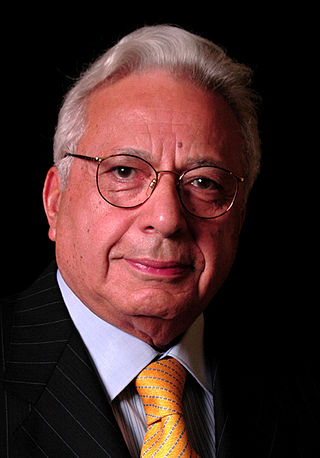Arthur Michael Kleinman is an American psychiatrist, social anthropologist and a professor of medical anthropology, psychiatry and global health and social medicine at Harvard University.

Ernst Rüdin was a Swiss-born German psychiatrist, geneticist, eugenicist and Nazi, rising to prominence under Emil Kraepelin and assuming the directorship at the German Institute for Psychiatric Research in Munich. While he has been credited as a pioneer of psychiatric inheritance studies, he also argued for, designed, justified and funded the mass sterilization and clinical killing of adults and children.
Germán Elías Berríos FMedSci, FRCPsych is a professor of Psychiatry at Cambridge University in the United Kingdom.

Nikolas Rose is a British sociologist and social theorist. He is Distinguished Honorary Professor at the Research School of Social Sciences, in the College of Arts and Social Sciences at the Australian National University and Honorary Professor at the Institute of Advanced Studies at University College London. From January 2012 to until his retirement in April 2021 he was Professor of Sociology in the Department of Global Health and Social Medicine at King's College London, having joined King's to found this new Department. He was the Co-Founder and Co-Director of King's ESRC Centre for Society and Mental Health. Before moving to King's College London, he was the James Martin White Professor of Sociology at the London School of Economics, director and founder of LSE's BIOS Centre for the Study of Bioscience, Biomedicine, Biotechnology and Society from 2002 to 2011, and Head of the LSE Department of Sociology (2002–2006). He was previously Professor of Sociology at Goldsmiths, University of London, where he was Head of the Department of Sociology, Pro-Warden for Research and Head of the Goldsmiths Centre for Urban and Community Research and Director of a major evaluation of urban regeneration in South East London. He is a Fellow of the British Academy, the Royal Society of Arts and the Academy of Social Sciences, and a Fellow of the Royal Danish Academy of Science and Letters. He holds honorary doctorates from the University of Sussex, England, and Aarhus University, Denmark.
Paul Stuart Appelbaum is an American psychiatrist and a leading expert on legal and ethical issues in medicine and psychiatry.
Jack Drescher is an American psychiatrist and psychoanalyst known for his work on sexual orientation and gender identity.

Michael Shepherd, CBE, FRCP, FRCPsych (Hon), FAPA (Corr), FAPHA was one of the most influential and internationally respected psychiatrists of his time, formerly Professor of Epidemiological Psychiatry, Institute of Psychiatry and Consultant Psychiatrist, The Maudsley Hospital, London and author of a number of influential publications in the field of psychiatry, including the seminal work Psychiatric Illness in General Practice.
Steven Edward Hyman is Director of the Stanley Center for Psychiatric Research at the Broad Institute of MIT and Harvard in Cambridge, Massachusetts. He is also Harvard University Distinguished Service Professor of Stem Cell and Regenerative Biology. Hyman was Provost of Harvard University from 2001 to 2011 and before that Director of the U.S. National Institute of Mental Health (NIMH) from 1996 to 2001. Hyman received the 2016 Rhoda and Bernard Sarnat International Prize in Mental Health from the National Academy of Medicine for "leadership in furthering understanding and treatment of psychiatric disorders as biological diseases".
Psychiatry is the medical specialty devoted to the diagnosis, prevention, and treatment of deleterious mental conditions. These include various matters related to mood, behaviour, cognition, and perceptions.

Ahmed Okasha is an Egyptian psychiatrist. He is a professor of psychiatry at Ain Shams University Faculty of Medicine, Cairo, Egypt. He wrote books and articles about psychiatry and mental disorders. He is the first Arab-Muslim to be president of World Psychiatric Association from 2002 to 2005.
Frank W. Stahnisch is a historian of medicine and neuroscience at the University of Calgary in Canada, where he holds the endowed Alberta Medical Foundation/Hannah Professorship in the History of Medicine and Health Care. He is jointly appointed in the Department of History, Faculty of Arts, and the Department of Community Health Sciences, Cumming School of Medicine, and is a member of the Calgary Hotchkiss Brain Institute and the O'Brien Institute for Public Health. He has also received an adjunct professorship in the Department of Classics and Religion of the Faculty of Arts. His research interests in the history and philosophy of the biomedical sciences cover: the development of modern physiology and experimental medicine, the history of neuroscience and the history of psychiatry, as well as the development of modern medical visualization practices. Since 2015, he has succeeded Professor Malcolm Macmillan as an Editor-in-Chief of the international "Journal of the History of the Neurosciences", and since 2021 he is also an Associate Editor for the History and Philosophy of the Behavioural Neurosciences with "Frontiers in Psychology"
Pamela Jane Taylor, is a British psychiatrist and academic, who specialises in the links between psychosis and violence, and mental and physical health in the criminal justice system. Since 2004, she has been Professor of Forensic Psychiatry in the Department Institute of Psychological Medicine and Clinical Neurosciences of Cardiff University.
Stephen Garrard Post has served on the Board of the John Templeton Foundation (2008-2014), which focuses on virtue and public life. He is a researcher, opinion leader, medical school professor, and best-selling author who has taught at the University of Chicago Medical School, Fordham University-Marymount, Case Western Reserve University School of Medicine (1988-2008) and Stony Brook University School of Medicine (2008-). He is widely known for his research on the ways in which giving can enhance the health and happiness of the giver, how empathy and compassionate care contribute to patient outcomes, ethical issues in caring for people with dementia, medical professionalism and the virtues, and positive psychology in relation to health and well-being. Post is an elected member of the College of Physicians of Philadelphia, the New York Academy of Medicine, and the Royal Society of Medicine, London. He was selected nationally as the Public Member of the United States Medical Licensing Examination (USMLE) Composite Committee (2000-2005), and was reappointed for outstanding contributions.
Alan F. Schatzberg is an American psychiatrist. He was the 136th president of the American Psychiatric Association (2009–2010). Since 1991, he has been the Kenneth T. Norris Jr. Professor of Psychiatry and Behavioral Sciences at Stanford University School of Medicine, and he was chair of the department from 1991 to 2010. He has received multiple national and international awards for his work as an investigator in the biology and treatment of depression. He is also the co-editor-in-chief of the Journal of Psychiatric Research, along with Florian Holsboer. He received an honorary doctorate from the Medical University of Vienna in 2011.

Kenneth S. Kendler is an American psychiatrist best known for his pioneering research in psychiatric genetics, particularly the genetic causes of schizophrenia. Kendler is one of the highest cited psychiatry researchers. Between 1990 and 1998 he was the 2nd highest cited psychiatrist, and for the 1997–2007 decade he was ranked 4th by Thomson Reuters' Science Watch. He has authored over 1,200 papers and in 2016 his h-index was 126. Kendler's group was also noted for the replication of a study of Avshalom Caspi on the interaction of stressful life events and a serotonin transporter polymorphism in the prediction of episodes of major depression.

The Center for Subjectivity Research (CFS) is an interdisciplinary research center at the University of Copenhagen, directed by Dan Zahavi. They work on a number of different topics: subjectivity, intentionality, empathy, action, perception, embodiment, naturalism, self-consciousness, self-disorders, schizophrenia, autism, cerebral palsy, normativity, anxiety, and trust, and do scholarly work on classical thinkers such as Kant, Hegel, Kierkegaard, Brentano, Husserl, Heidegger, Wittgenstein, Merleau-Ponty, Levinas, and Ricoeur. They put a variety of philosophical and empirical perspectives on subjectivity into play to obtain mutual enlightenment, and methodological and conceptual pluralism. Hence, they have had collaborations within different disciplines such as phenomenology, analytic philosophy, hermeneutics, psychiatry, neuroscience, philosophy of religion, Asian philosophy, developmental psychology, clinical psychology, and cognitive science.
Charles L. Raison is an American psychiatrist and professor of psychiatry at the University of Wisconsin-Madison School of Medicine and Public Health as well as the Mary Sue and Mike Shannon Chair for Healthy Minds, Children & Families and Professor with the School of Human Ecology in Madison, Wisconsin.

Michael Alan Schwartz is an American academic and psychiatrist based in Weston, Connecticut. In 2018 Schwartz retired as clinical professor of psychiatry and joint professor of humanities in medicine at the Texas A&M School of Medicine. He continues practicing psychiatry as well as writing and editing psychiatric books and articles. His work focuses on advancing pluralistic, person and people-centered approaches to psychiatric assessment, care and treatment.
John H. Coverdale is a New Zealand-born academic psychiatrist, educator and editor. He is currently a full professor of psychiatry, behavioral sciences, and medical ethics at Baylor College of Medicine.






